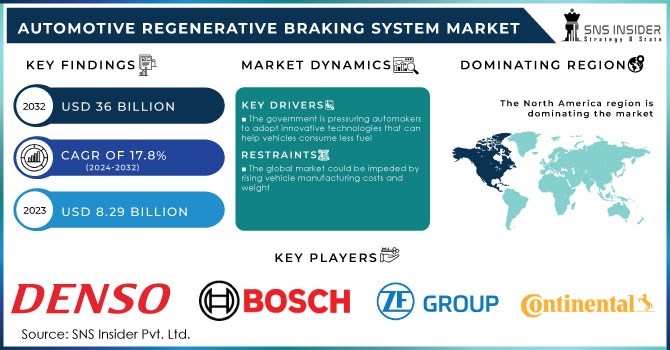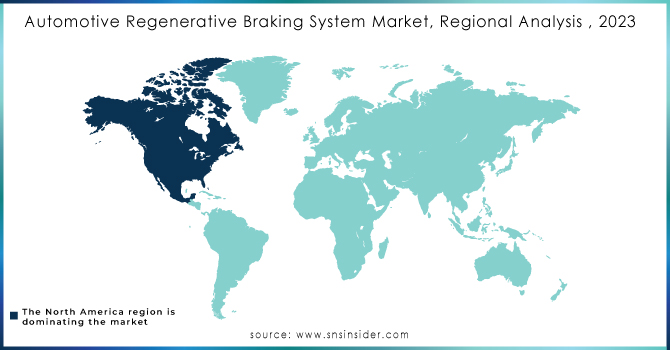Automotive Regenerative Braking System Market Size & Overview:

Get More Information on Automotive Regenerative Braking System Market - Request Sample Report
The Automotive Regenerative Braking System Market Size was valued at USD 8.29 billion in 2023 and is expected to reach USD 36 billion by 2032 and grow at a CAGR of 17.8% over the forecast period 2024-2032.
The developing braking system is an energy recovery device that converts the kinetic energy generated during vehicle speed decrease into electrical energy. This converted energy is stored in the vehicle's storage unit, where it is used to power the vehicle's interior electronics as well as other uses such as headlights and start-stop operations. In a regenerative braking system, energy storage components such as ultra-capacitors, flywheels, batteries, and others are used. Regenerative braking systems can save between 5% and 20% of the transmitted energy, depending on the stopping pattern and vehicle speed.
The automotive regenerative braking system market is expected to increase significantly due to its benefits, which include improved vehicle performance and reduced braking system wear and tear when compared to traditional braking systems. Regenerative braking is an emerging braking technology in the automobile industry that can be used in both traditional and electric vehicles. Furthermore, electric vehicles are heavy users of the regenerative braking system.
MARKET DYNAMICS:
KEY DRIVERS:
-
The government is pressuring automakers to adopt innovative technologies that can help vehicles consume less fuel
-
The growing popularity of regenerative braking
-
Increasing the participation of commercial and passenger cars
-
Infrastructure for electric vehicle supply equipment (EVSE)
RESTRAINTS:
-
The global market could be impeded by rising vehicle manufacturing costs and weight
-
The components' high functional complexity may impose market constraints
-
The high maintenance and repair costs may limit the Market's expansion
OPPORTUNITIES:
-
Mass production of the regenerative braking system is expected to lower the system's cost
-
Due to technological advancements
CHALLENGES:
-
Due to the increasing overall cost of the vehicle, the global market may face hurdles
-
The COVID-19 pandemic, which has caused supply chain disruption, is a current difficulty
IMPACT OF COVID-19:
The ongoing COVID-19 epidemic has hampered the growth of the Automotive Regenerative Braking System Market in 2020. Many areas have implemented shutdowns and lockdowns, resulting in a shortage of automobiles, supplies, and transportation, among other things.
However, several safety precautions and strategies have been implemented by worldwide key competitors in order to improve the global market growth. In the current scenario, the worldwide market is aiming for a larger market size during the forecast period.
MARKET SEGMENTATION:
By Electric Vehicle:
The global market is divided into hybrid electric vehicles, battery vehicles, and plug-in hybrid electric cars based on the electric vehicle segment. Due to its versatility in terms of vehicle driving range and external charging, the lug-in hybrid electrical vehicle market has shown substantial growth in the previous year and is expected to yield the highest Market Share for the projection period.
By Vehicle Type:
According to the vehicle type segment, the global market is divided into passenger vehicles, two-wheelers, and commercial vehicles. Because of rising electric car demand in countries such as Japan, the United States, and China, the passenger vehicle category is expected to create the Highest Market Share during the research period.
REGIONAL ANALYSIS:
Asia-Pacific, North America, Europe, and the Rest of the World are the four major regions that make up the global Automotive Regenerative Braking System Market. Because of the high penetration of electric vehicles in the region and the presence of significant important market players, the North American regional market is expected to lead the global market with the highest Market Share for the projection period.
Aside from that, the Asia-Pacific region is predicted to have the greatest Market Growth over the projection period. Because of plug-in hybrid electric vehicles in developing countries like South Korea, China, and Japan, as well as growing urbanization, hybrid penetration, and population purchasing power, this regional market has seen stronger growth.

Get Customized Report as per your Business Requirement - Request For Customized Report
KEY PLAYERS:
Major key players included in this report are ZF Friedrichshafen AG (Germany), Robert Bosch GMBH (Germany), Denso Corporation (Japan), Continental AG (Germany), Delphi Automotive PLC (US), Mazda Motor (Japan), Hyundai Mobis (South Korea), Maxwell Technologies, Faurecia SA (France), TRW Automotive (US), ADVICS North America, Autoliv Nissin Brake Systems Co., Ltd. (Japan).
| Report Attributes | Details |
| Market Size in 2023 | US$ 8.29 Billion |
| Market Size by 2032 | US$ 36 Billion |
| CAGR | CAGR of 17.8% From 2024 to 2032 |
| Base Year | 2023 |
| Forecast Period | 2024-2032 |
| Historical Data | 2020-2022 |
| Report Scope & Coverage | Market Size, Segments Analysis, Competitive Landscape, Regional Analysis, DROC & SWOT Analysis, Forecast Outlook |
| Key Segments |
• by Electric Vehicle Type (Hybrid electrical vehicle, Battery vehicle, Plug-in hybrid electric vehicle) |
| Regional Analysis/Coverage | North America (USA, Canada, Mexico), Europe (Germany, UK, France, Italy, Spain, Netherlands, Rest of Europe), Asia-Pacific (Japan, South Korea, China, India, Australia, Rest of Asia-Pacific), The Middle East & Africa (Israel, UAE, South Africa, Rest of Middle East & Africa), Latin America (Brazil, Argentina, Rest of Latin America) |
| Company Profiles | ZF Friedrichshafen AG (Germany), Robert Bosch GMBH (Germany), Denso Corporation (Japan), Continental AG (Germany), Delphi Automotive PLC (US), Mazda Motor (Japan), Hyundai Mobis (South Korea), Maxwell Technologies, Faurecia SA (France), TRW Automotive (US), ADVICS North America, Autoliv Nissin Brake Systems Co., Ltd. (Japan). |
| Key Drivers | • The government is pressuring automakers to adopt innovative technologies that can help vehicles consume less fuel. • The growing popularity of regenerative braking. |
| RESTRAINTS | • The government is pressuring automakers to adopt innovative technologies that can help vehicles consume less fuel. • The growing popularity of regenerative braking. |

